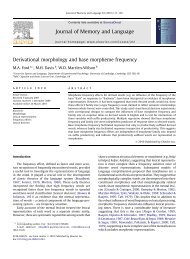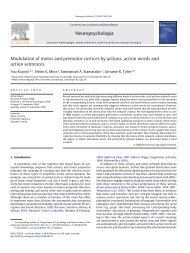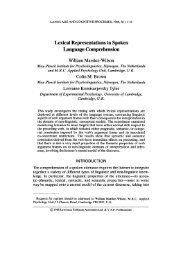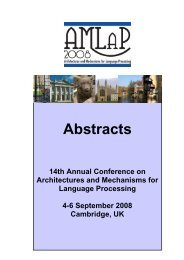Towards a psychological basis for a theory of anaphora - Centre for ...
Towards a psychological basis for a theory of anaphora - Centre for ...
Towards a psychological basis for a theory of anaphora - Centre for ...
Create successful ePaper yourself
Turn your PDF publications into a flip-book with our unique Google optimized e-Paper software.
sufficient by itself to produce the obtained on-line preferences. Consider, <strong>for</strong> example, the context clause 1<br />
"If you walk too near the runway". This context leads<br />
to a certain preferred reading <strong>of</strong> the fragment "landing 1<br />
planes". But the context clause by itself cannot be the<br />
only source <strong>of</strong> the preference. If, <strong>for</strong> example, the<br />
fragment had been "avoiding planes*, then the 1<br />
a1 ternative structural reading would naturally have been<br />
adopted, even though the context stayed the same. The /<br />
prsferences obtained in this experiment must involve the<br />
on-line analysis <strong>of</strong> the meanings <strong>of</strong> the words and their<br />
structural proper ties, relative to the most plausible<br />
interpretation <strong>of</strong> this in<strong>for</strong>mation given the scenario<br />
set up by the context clause.<br />
The descriptions <strong>of</strong> this and the previous<br />
experiment give the general flavor <strong>of</strong> the approach we 1<br />
have been developing to the speech understanding problem<br />
- that is, to the characterization <strong>of</strong> the basic<br />
properties <strong>of</strong> the processes involved, as they take place<br />
over time. We emphasise here the finding that the<br />
fundamental goal <strong>of</strong> the speech understanding process<br />
- l<br />
the interpretation <strong>of</strong> the message - isnotonly in<br />
progress immediately an utterance begins, but is also 1<br />
intimately connected to analysis processes throughout<br />
the system. We now turn to the implications <strong>of</strong> this <strong>for</strong><br />
the study <strong>of</strong> <strong>anaphora</strong> - in particular, <strong>for</strong> the types <strong>of</strong> 1<br />
"discourse' or intersen tential" <strong>anaphora</strong> involved<br />
the experiments we will shortly be reporting. in 1<br />
3. Some Implications --<br />
Our research indicates that all speech processing<br />
involves an immediate attempt at a mapping onto a mental<br />
representation <strong>of</strong> the previous and current discourse<br />
interpretation. This means, then, that no lexical item1<br />
is ever analysed in isolation from the consequences<br />
should have <strong>for</strong> its interpretative context. Now, the it l<br />
special feature <strong>of</strong> <strong>anaphora</strong> is supposed to be<br />
precisely1<br />
this - that their interpretation requires a mapping onto<br />
an antecedent [2]; onto a location in the/<br />
representation <strong>of</strong> the prior discourse.<br />
But from our present perspective we can see that1<br />
<strong>anaphora</strong> are not really special in this respect. It is1<br />
true that <strong>for</strong> lexical iteins which are not in some way<br />
semantically attenuated in their specification - as/<br />
Bolinger (1977; 1979) puts it - one can more r5adily<br />
maintain the illusion that they are processed jast on<br />
their own terms. We suggest, however, that this is just<br />
an illusion. In the case <strong>of</strong> <strong>anaphora</strong>, <strong>of</strong> course, this<br />
illusion never became sustainable in the first place. (<br />
This is not, however, to minimise the importance <strong>of</strong><br />
the problem <strong>of</strong> <strong>anaphora</strong> in speech understanding. They<br />
are indeed attenuated indicators <strong>of</strong> pakhs through the1






